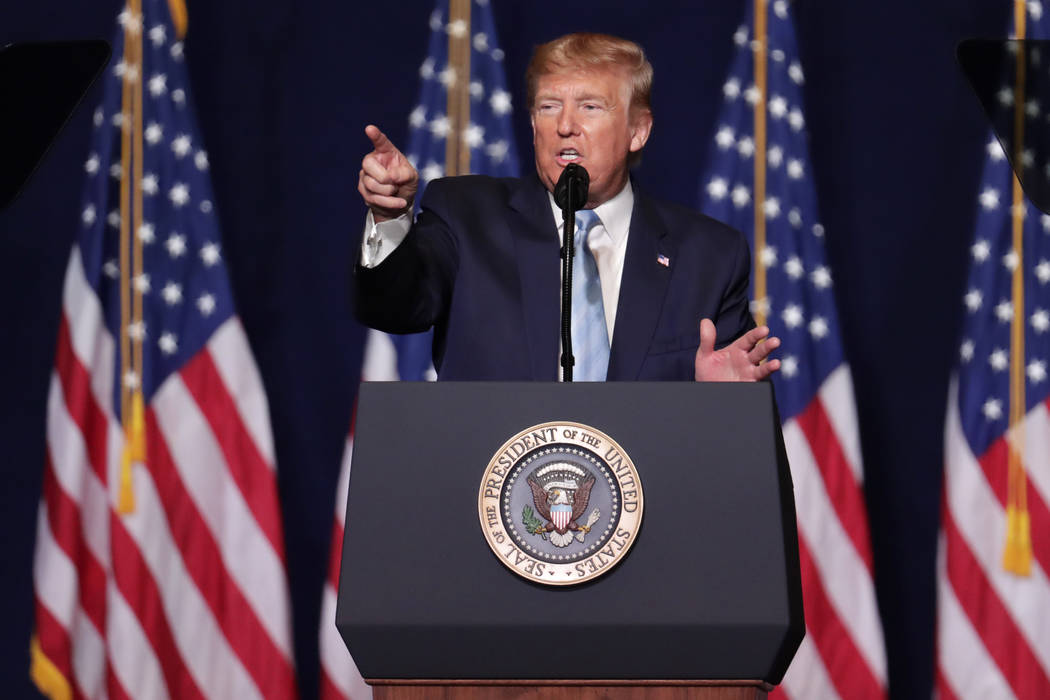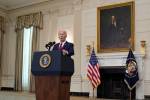Congress returns to work still at impasse over impeachment
WASHINGTON — Congress returns this week to the same confusion it faced when it left.
The House and Senate remain in an impasse over a trial of President Donald Trump on articles of impeachment passed by the House that charge him with abuse of office and obstruction of Congress.
After a two-week stay at his Florida resort, Trump returned to Washington on Sunday facing a second challenge: the fallout from the strike he ordered to kill an Iranian general who was designated as a terrorist by the United States in 2011.
Even before Air Force One touched down outside the nation’s capital, Trump faced growing questions from Democrats fearful that the killing of Revolutionary Guard Gen. Qassem Soleimani endangered Americans in the region and may have been an effort to distract from the president’s political crisis back home.
Still, Democrats said the heightening tensions with Iran would not dissuade them from Trump’s impeachment.
“I think our system is strong enough that we can do both,” Sen. Chris Van Hollen, D-Md., told Fox News Sunday.
Cold feet?
As Senate leaders filtered back into Washington on Friday for a pro-forma session without votes, Majority Leader Mitch McConnell, R-Ky., accused House Speaker Nancy Pelosi, D-Calif., of getting cold feet on impeachment.
“Instead of sending the articles to the Senate, they flinched,” McConnell said.
Pelosi has withheld the articles of impeachment as leverage for what she calls a fair trial process in the Senate that includes witnesses who were prevented by Trump from testifying before the House.
“Why won’t Trump & McConnell allow for a fair trial,” Pelosi wrote on Twitter.
But McConnell said the House rushed through a “slap-dash” impeachment inquiry that produced articles without the backing of documents and testimony they now want.
McConnell said it was now the Senate’s turn to take its time with the procedure and to slow down the “short-term partisan rage” in the House that produced the charges against the president.
He called accommodations that would allow Pelosi to design the Senate impeachment trial process “a non-starter.”
Since the holiday break, Democrats cite emails that have been made public that bolster their case that the president was directly involved in withholding military aid to Ukraine while he sought political investigations that would benefit his re-election bid.
Senate Minority Leader Chuck Schumer, D-N.Y., said those documents should be included in the trial and that precedent from previous impeachment trials against Bill Clinton and Andrew Johnson would allow for witnesses to be called before the Senate.
Three witnesses were called before the Senate trial for Clinton.
Schumer said McConnell does a lot of “finger pointing, name calling and misreading history, but gives not a single argument or discussion about the issue that’s holding up the Senate trial, whether there will be witnesses and documents.”
Four witnesses sought
Van Hollen said there are four witnesses that Democrats want to appear before the Senate about the Ukraine dealings who did not speak to House investigators “because the president ordered them not to testify.”
Democrats want acting White House chief of staff Mick Mulvaney, former national security adviser John Bolton and two administration officials with knowledge about the president’s actions to withhold the military aid from Ukraine called as witnesses.
One of those administration officials is Michael Duffy, who Van Hollen said sent an email to the Pentagon just 91 minutes after a telephone call between Trump and Ukraine President Volodymyr Zelenskiy ordering U.S. military officials to withhold the aid per direction of the president.
Van Hollen said the four witnesses have clear “first-hand knowledge” of the president’s role in the withholding of aid and the political investigations he sought in Ukraine.
Democrats questioned why Republicans would want to withhold documents in a trial that Trump has openly claimed will clear him of any wrongdoing.
“When you are accused of something, you don’t suppress evidence that would exonerate you,” Schumer said.
Democrats hope their arguments move centrist Republicans, some of whom have come out against comments by McConnell to work hand in glove with the White House on the trial proceedings.
Sen. Lisa Murkowski, R-Alaska, and Sen. Susan Collins, R-Maine, have both said the Senate should be an impartial jury in judging the articles of impeachment presented by House managers.
Democrats need only four Republicans to force McConnell to allow witnesses and documents in the trial.
A Democrat, Sen. Jacky Rosen of Nevada said she has taken an oath to protect the Constitution.
When a trial is conducted in the Senate, “I’m going to do my homework and keep an open mind and see what’s presented,” Rosen said.
Meanwhile, McConnell and Schumer have yet to reach agreement on rules moving forward that would allow a trial to begin potentially as soon as this week when rank-and-file lawmakers return to the Capitol.
Until then, “we remain at an impasse,” McConnell said.
The Senate is in full session on Monday and the House returns for business on Tuesday.
Contact Gary Martin at gmartin@reviewjournal.com or 202-662-7390. Follow @garymartindc on Twitter. The Associated Press contributed to this report.






























